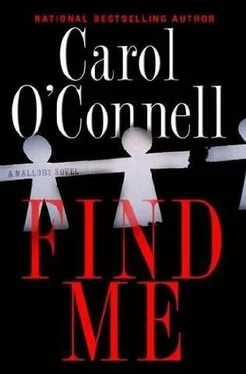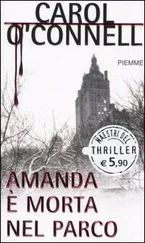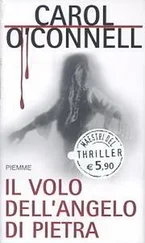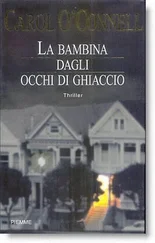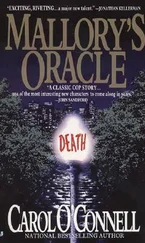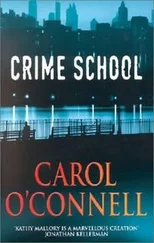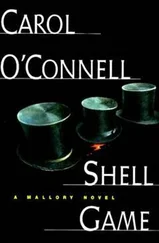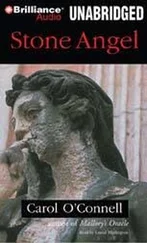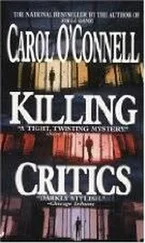“There’s dying and there’s dying.” Charles imagined each one of them sitting around the house with only profound grief for company, knitting socks for grief and spoon-feeding it with melancholy. Here, on this road, these people had a mission. At last, something lay ahead of them, and they could see into the day after tomorrow. The caravan city had nurtured them; it was solace and companionship, and, while the old man had been among them, there had been some order to their daily lives.
All of this came to an end as the ambulance bore their shepherd away.
The emergency vehicle raced past the travel plaza. The parents faced the road in silence, helpless to do anything but watch the distant ambulance spinning its lights, siren screaming, disappearing down the interstate. They revolved in place, turning this way and that, as if they lacked the ballast to withstand the wind of a blown kiss, ultimately deflating, collapsing to sit upon the ground or squat by their cars.
Mallory walked toward them, and, one by one, they turned their eyes to her. Charles understood what was happening. She was law and order to them, a protector of sheep.
Their new shepherd.
They watched as she came closer. Their necks were elongating, eyes widening, bodies all but levitating with expectation.
And Mallory’s first pronouncement?
“Go home!”
Well, not the best of beginnings.
The people remained quiet, still hopeful, waiting for the next and perhaps more inspiring words, but Mallory turned her back on them and walked away. They followed her awhile with their sheep’s e yes, then nodded to one another, as if agreeing all around, Excellent choice.
Riker shook his head. Charles shrugged, then followed after Mallory- an old habit of his.
When the new campsite had been paid for and the vehicles drawn into a circle, Riker sat on the fender of the Mercedes, his eyes turned to open land. The New Mexico mesas were dark purple and the grasslands had turned to gray at nine o’clock.
Charles sipped coffee, and Riker smoked cigarettes while he speculated on the suicide of Savannah Sirus.
“The way I see it,” said the detective, “it was all about guilt. Let’s say Mallory’s mother was pregnant when Peyton left her for the other woman. So Savannah went to New York looking for absolution-” He threw his hands up. “And the lady just picked the wrong confessor.”
“A bit simplistic,” said Charles. “Back up a bit. First she must’ve sent Mallory a token letter written by Peyton Hale. Maybe she thought that would end the matter.”
“Then Mallory wants the rest of the letters, all of them,” said Riker. “She knows she’s been cheated. Savannah spent three weeks in Mallory’s apartment, more than enough time for a full confession. I’ve seen the kid break hardcore felons in less than an hour.”
“All right,” said Charles. “But Mallory was simply behaving like- Mallory. You might as well ask a gun to change its nature. I don’t see any intent here, no campaign to drive that woman to suicide.”
Their conversation ended with Mallory’s approach. And Charles wondered if she could read the guilt in his face. Of course she could-if she wanted to, but Mallory never even looked his way. She sat down on a campstool and settled the computer on her lap. She seemed to want their company, but not their conversation. Her eyes were trained on the glowing screen except for occasional glances at a nearby campfire where a little girl lay asleep on a bedroll.
Joe Finn was struggling to assemble the pup tent without waking his daughter. His son, Peter, was staring at Mallory. The boy was rising now and walking toward her. When Peter came a little closer, Charles could see that his shining young face was at odds with his eyes-the eyes of an old man. The child’s walk had purpose in every step he took toward the young detective. He had some serious business with her.
Be careful, boy.
Peter Finn tapped Mallory on the shoulder, but he was unsuccessful in getting her attention away from the computer in her lap.
“What is death?”
“You know what it is,” she said, never looking up from the glowing screen.
“But you know more than I do.”
Charles closed his eyes. It all made sense. The boy had picked the person least likely to tell a kind lie and most likely to know the truth on this subject.
“Death,” said the boy, “tell me about it?”
Eyes still on the screen, she said, “It’s the next thing that happens after life.”
“And then?”
Now she did raise her eyes to the boy and gave him a look of mild surprise that asked, You want more?
And, no, Charles could see that the boy did not. This life was quite enough, more than enough. Life was hard. The child’s idea of heaven was apparently kindred to Mallory’s. Simply put: no more of this existence- and nothing more than that.
“My sister Ariel-she’s really dead, isn’t s he?”
“Yes,” said Mallory, lover of brevity.
“Well, that’s all right then,” said the boy. No more of this for Ariel. “Will you tell that to my father-so we can go home?”
“You think he’d listen to me?” said Mallory.
Apparently not. His last hope exhausted, the boy turned around and walked away, a hundred years older now.
Charles went after him. “May I talk to you for a moment?”
Peter stopped and turned around, saying, “Please don’t tell me that Ariel’s in heaven.”
Charles knelt down on one knee to be eye level with the boy. “I’ll tell you everything I know about heaven. I learned this in Sunday school. Christ said, ‘Heaven is all around them and men do not see it.’ I think he was onto something there. Personally, I can’t imagine anything that can eclipse life. The best part is up ahead, and you don’t w ant to miss that.”
He could see that this was cold comfort to a weary child who needed structure and a sense of normalcy if he was to survive. A good start would be something simple like a conventional bed where Peter could lay his head each night. Charles turned to watch the boxer struggle with each rope and stake, trying to work a simple tent into its ultimate shape, all the signs of depression in each failure.
“I’m going to have a talk with your father.”
The young fatalist shook his head. “Dad won’t listen to you.”
As Charles approached Joe Finn, he mentally turned a leaf in the Mallory Book of Hard Truth and Bad Manners. He planned to stab this man in the heart with hard facts. “Ariel is dead, and you know that. She died a long time ago. And your son wants to die.”
Now that he had all of the boxer’s angry attention, Charles turned to look at the man’s surviving daughter, awake now, distraught and humming. “And that’s gone on much too long. She needs more help than you can give her. I can arrange for a child psychiatrist to work with Dodie. But first you have to go into protective custody in Chicago. It’s the police this time, not the FBI.”
He sensed the boxer’s resistance. The man’s closed fists were a clue.
“She’s the child most like you,” said Charles. “If this pilgrimage doesn’t end now, you and Dodie will be rocking side by side, humming in the dark, and your boy will be all alone. And then he’ll die. I know you want to do the right thing. That’s what this is all about, isn’t it? Fathers always go out into the night in search of the lost child. Well, Ariel’s dead. It’s the other two who are lost.”
“That’s not what the man wants to hear, Charles.” Mallory had materialized behind the boxer, making him spin around to face her. She ignored him and spoke only to Charles. “He’s not listening to you.” She had removed her jacket, and the gun in her shoulder holster was on display. Now she turned to acknowledge Joe Finn, her legs apart, arms slightly bent at her sides. And Charles found this a most interesting moment-a gun-slinger squaring off against a pugilist.
Читать дальше
